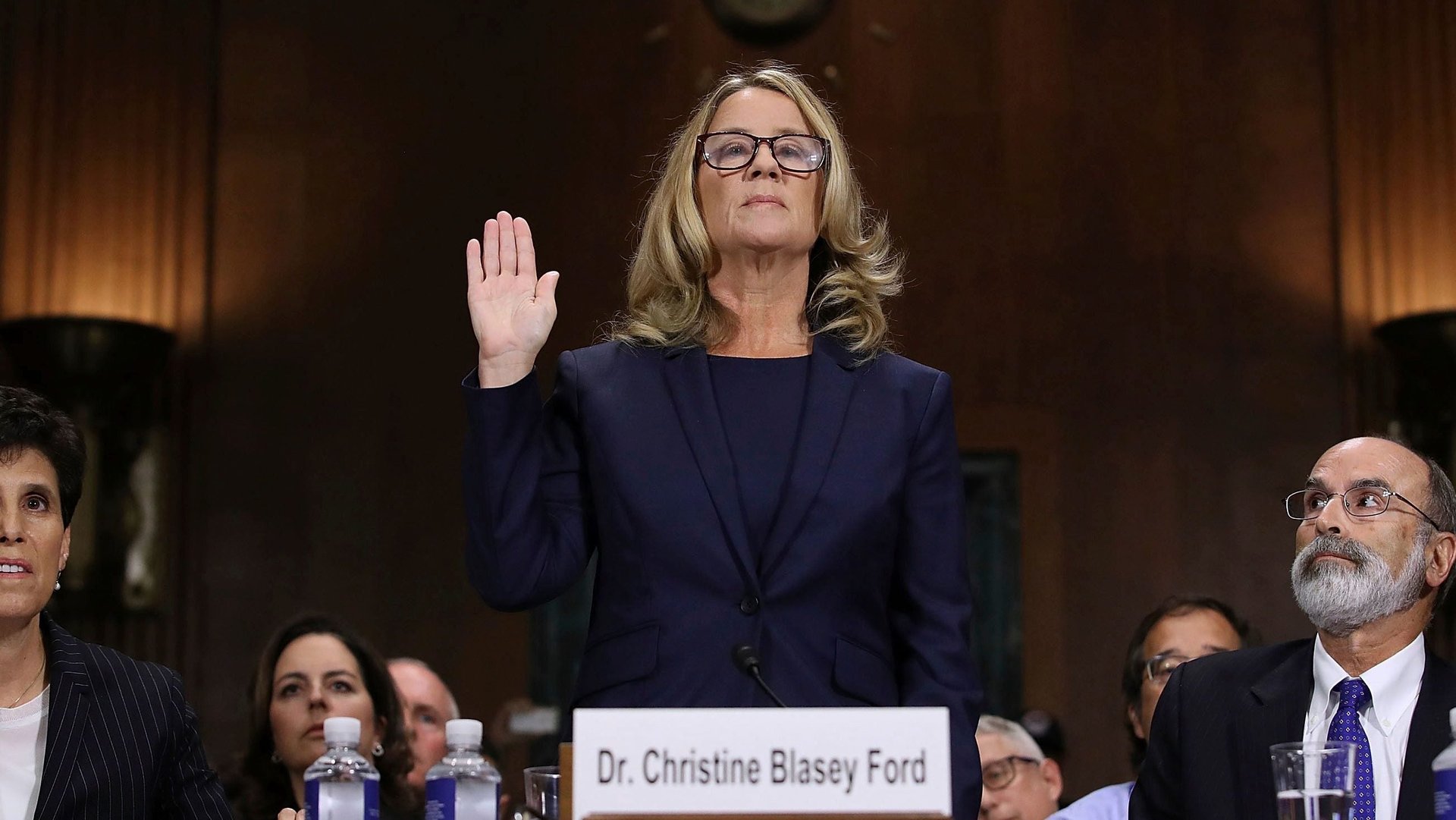Christine Blasey Ford’s testimony is a lesson in what it’s like to live as a woman
Today in Washington, DC, Christine Blasey Ford broke down the details of experiencing an attempted rape. She described the traumatizing assault as people around the world watched, and as the Senate Judiciary Committee questioned her, in an effort to establish whether her alleged assailant, Brett Kavanaugh, is fit to sit on America’s Supreme Court’s bench.


Today in Washington, DC, Christine Blasey Ford broke down the details of experiencing an attempted rape. She described the traumatizing assault as people around the world watched, and as the Senate Judiciary Committee questioned her, in an effort to establish whether her alleged assailant, Brett Kavanaugh, is fit to sit on America’s Supreme Court’s bench.
Although the point of the hearing is to determine whether Kavanaugh is a good choice for a lifelong government appointment, much of the hearing seemed designed to put Ford on trial, with prosecutor Rachel Mitchell attempting to scrutinize every detail of Ford’s memory. Ford was emotional but thorough, clear about what she did and did not remember, and cautious in her descriptions. Alleging that Kavanaugh covered her mouth with his hand to prevent her from screaming, she said she had feared he might kill her. But she qualified that her fear was that he might do so “accidentally.”
For many women, it’s been painful to see Ford compelled to relive such a traumatic event out of her sense of civic duty. The hearing has been a perfect encapsulation of the reality of rape culture and the misogyny we all live with. But it can also be an impactful experience for men—as it is an opportunity for them to witness, in dramatic fashion, what it feels like to be a woman in the world.
Both men and women can be victims of sexual abuse and assault. But women bear the additional burden of living in a misogynistic society. And so, whether or not an individual woman has experienced assault, she can likely find something familiar in Ford’s testimony about how she was forced in a room, groped, trapped, and prevented from screaming. She can recognize herself in Ford’s ongoing anxiety and post-traumatic stress disorder, in the California professor’s claustrophobia and desire to have two front doors. Women live with the constant, quiet fear—a knowledge, really—that something like what Ford described might happen to them.
This is what it’s like to exist as a woman in the world.
Women are programmed from an early age to take on the responsibility of it. They learn, as little girls, to sit with their legs closed. They are told, as teenagers, that they should not drink too much or stay out too late. And they see, as adults, that if all their caution is not enough, if despite all the planning and fearing they are still attacked, they will be blamed for the harm that came to them. They will be doubted and shamed. A sexual assault will be their failure, their mistake.
On that point, too, the investigation into Ford’s claims has been enlightening. She asked the FBI to investigate; the agency did not. So many keep asking why did she not report, but the questions during the testimony should provide at least a clue. To report, amongst other things, meant having to be the subject of any number of questions, all somewhat declining one overarching doubt: Is she worth believing? Had she really, that day, been swimming? Did she have anything to drink before the party? Was she taking any medication at the time? Was it a party? Was it a gathering? What was the purpose? Why did she go? Is she sure she’s not mistaken? Does she really have no doubts?
“One hundred percent,” Ford said in her testimony, owning the strength of her truth. Despite all that has happened to her, 36 years ago and then again in the past few weeks, Ford was resolved to go forward out of a sense of civic duty. She withstood scrutiny with compassion and clear determination, asking for nothing but a coffee, if that was convenient, please.
And so Ford has taught yet another lesson to anyone watching: Not just about what it’s like for women to live in a man’s world, but about the courage and resilience that women have in spite of this reality.
In the word of senator Patrick Leahy of Vermont, who had listened to Ford in the hearing:
No matter what happens at this hearing, to this nomination… There are millions of victims and survivors out there who’ve been inspired by your courage. Bravery is contagious. Indeed that’s the driving force behind the #MeToo movement. And you sharing your story is going to have a lasting positive impact on so many survivors in this country. We owe you a debt of gratitude for that, doctor.